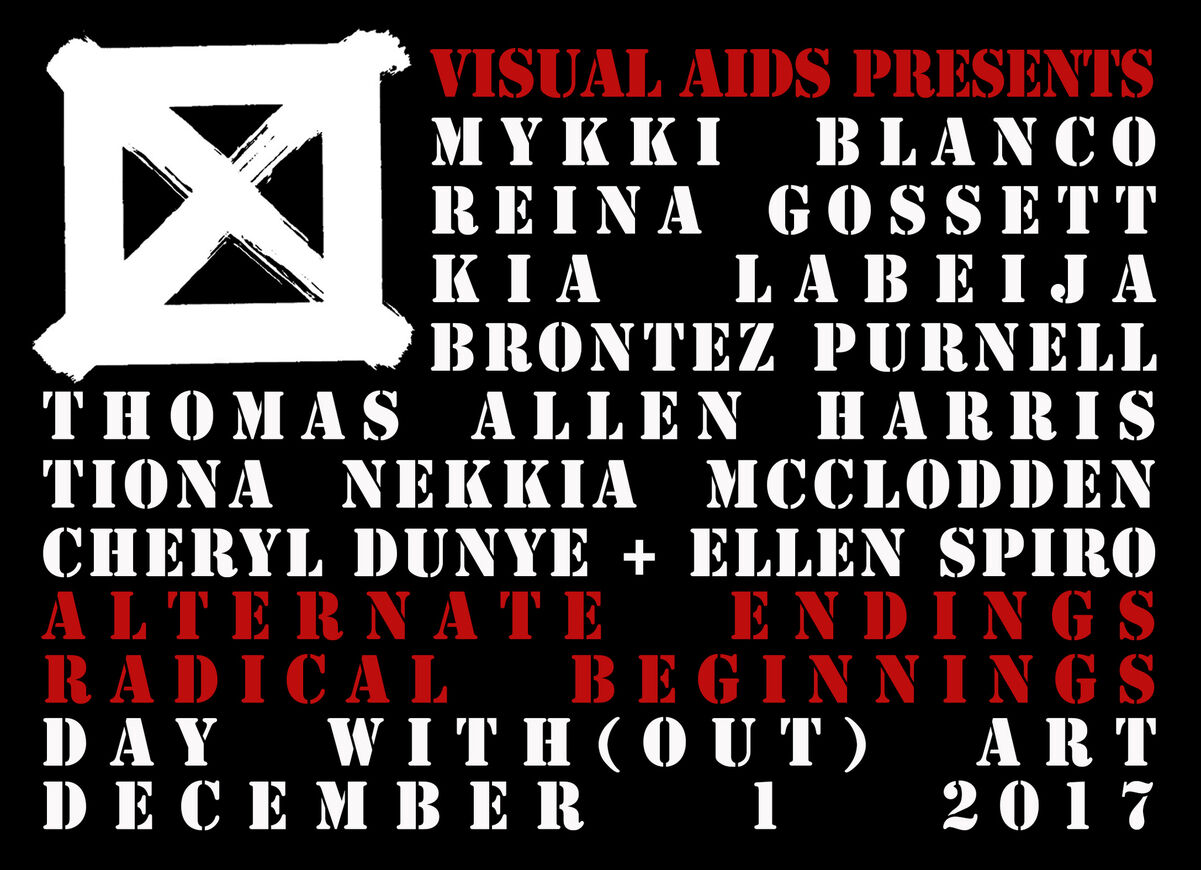Wearing a Keith Haring pin on World AIDS Day is not enough. In fact, wearing a Keith Haring pin and heading to one of the 116 venues worldwide screening ALTERNATIE ENDINGS, RADICAL BEGINNINGS featuring new video work by seven black artists may not be enough to memorialize those lost to AIDS either.
But for the past 28 years, Visual AIDS’ Day With(out) Art project, which promotes and advocates for HIV+ artists, the 28th annual project is once again starting a conversation.
Curators Erin Christovale and Vivian Crockett insert the artists into the conversation, or in some cases remind viewers these artists have always been part of the conversation about AIDS, history and memory.
Rapper Mykki Blanco in Stones & Water Weight challenges the idea that people living with HIV, such as herself, are weak. Blanco performs various tasks, some incredibly stressful, to say, I’m just as healthy as you. Blanco endures and succeeds in showing what research shows: HIV+ are just as strong and resilient as their HIV- peers.
Emotional strength is a theme of Goodnight, Kia from Kia LaBejia. The artist is one of the estimated 17 million children who one or both parents have died from an AIDS-related illness. LaBejia was one of them after her mother Kwan Bennett died in 2004. Like other children, many of whom have also contracted the virus, are ultimately displaced.
DeShawn is the main character in Brontez Purnell’s 100 Boyfriends Mixtape (The Demo). The ghosts of 100 men, both his ex-boyfriends and their exes, haunt the young man, who spends his days recklessly partying. This character sketch features him describing his worldview on the phone to an unidentified caller while also shrinking into a pair of shoplifted jeans.
Tiona Nekkia McClodden plays voyeur and architect in The Labyrinth 1.0, a film essay combining surveillance footage from 1970s tearooms with various film shots across Philadelphia. Based on a Brad Johnson’s poem of the same name, McClodden’s meditates on the role of erotic spaces, such as porn theaters, and cruising in a never-ending labyrinth.
Day With(out) Art 2017 trailer from Visual AIDS on Vimeo.
Reina Gossett looks at space and exclusion too in Atlantic is a Sea of Bones. Based on another poem of the same name by Lucille Clifton tracing New York-based performer Egypt LaBejia across three decades. The landscape for black and trans people remains precarious. But the characters navigate their own labyrinth, an emotional and physical one. They endure and resist in the face of violence, tragedy and loss. They continue to come together, too, in historic safe spaces like clubs.
Some works are by veteran artists who are revisiting their early work. In About Face: The Evolution of a Black Producer, Thomas Allen Harris reflects on his public television programs from the early 1980s focused on people who had been excluded from the conversation about HIV/AIDS. Harris received substantial pushback from media executives and audiences, ultimately leading him to suspend production.
Ellen Spiro revisits her 1991 documentary, DiAna’s Hair Ego, about DiAna DiAna, a hair stylist who promoted safe sex education at her salon in Columbia, South Carolina. Spiro heads back south, this time with director Cheryl Dunye, in DiAna’s Hair Ego REMIX. DiAna is still promoting safe sex during the new AIDS crisis afflicting young people of color in the south.
Christovale and Crockett in their beautiful curatorial statement believe this show is imperative. AIDS histories, even as the number of exhibitions about the era and artists like Haring, have increased, are continually whitewashed. This is as evident as the recent Art AIDS America, a travelling exhibition which was criticized for excluding artists of color.
“As curators of a program like this, it’s absolutely our responsibility to intervene in that conversation, which remains very much dominated by white men. Our varied histories are not being sufficiently honored, historicized and remembered,” the duo write. “We are asserting that these artists have been doing this work and that these histories have existed, whether or not they are recognized.ALTERNATE ENDINGS, RADICAL BEGINNINGSis a reclamation and affirmation of what has always been here.”
The video will be available online beginning December 8.
For a list of screenings, click here.
Films:
The Labyrinth 1.0
Tiona Nekkia McClodden
Goodnight, Kia
Kia LaBejia
100 Boyfriends Mixtape (The Demo)
Brontez Purnell
DiAna’s Hair Ego REMIX
Cheryl Dunye and Ellen Spiro
Atlantic is a Sea of Bones
Reina Gossett
Don't forget to share:
Help make sure LGBTQ+ stories are being told...
We can't rely on mainstream media to tell our stories. That's why we don't lock our articles behind a paywall. Will you support our mission with a contribution today?
Cancel anytime · Proudly LGBTQ+ owned and operated
Read More in Culture
The Latest on INTO
Subscribe to get a twice-weekly dose of queer news, updates, and insights from the INTO team.
in Your Inbox













